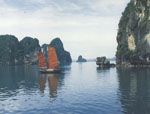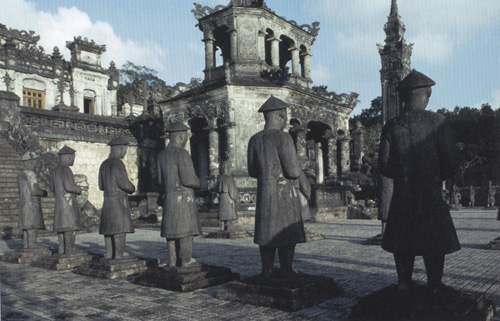AV/AS s16
Understanding Vietnam: Its History and Culture
Trian Nguyen
Department of Art and Visual Culture

Ha Long Bay, Sail Boat and Islands
Description: This unit affords students an opportunity to study a wide range of Vietnamese history and culture through a multidisciplinary lens. Students explore Vietnam within the framework/context of specific historical and visual culture, ranging from ancient monuments to contemporary sites. The focus of the unit is twofold: a) visiting a variety of field sites including national museums, historical monuments, imperial palaces and tombs, traditional craft villages, and important sites of battles during the Vietnam War; b) participating in discussions of background texts and field trip experiences in light of historical and cultural contexts. Students are required to take on-site notes and write daily journals.Purposes

Thai Hoa Palace
The unit studies Vietnam in its particularity as it appears across several conventions: architecture, ancient and modern monuments, cultural performances, and craft villages. The focus is on close reading and direct referencing of work done at the sites. Other issues, such as how Americans understand Vietnamese culture, how the modern history or Vietnam has shaped our thinking about war and peace, and how this helps students experience the culture of a country.

Ninh Thuan, Champe later style, Po Klaung Garai (South View)
Pedagogy: The class begins by watching a list of both document and feature movies, and background reading to help students gain a good knowledge of the country, history and culture before departing. The unit takes more than a day of international travel by airplane to Hanoi, Vietnam and four weeks of intensive study tour in the country. Students fly out from Ho Chi Minh City back to the JFK airport.
We travel at least five days a week on a bus to visit museums as well as cultural and historical sites. We use the time on the tour bus to go over reading, cultural and historical background and some discussions, led by students. Students are required to finish all required readings, participation in field visits, site observation, discussion, and keep daily journals.

Hue, octagonal pavilion housing the stele of emperor Khai Dinh
The unit has four full days off at each major city, i.e., Hanoi, Hue, Nha Trang and Saigon when the unit anchors for more than four days. This is a time for students to rest, read, write and reflect. It is also time for me to read, comment and grade students’ journals and contact local lecturers and make arrangements. At the same time, if students want to visit certain places of their own interest in the area, they can do it by themselves with my guidance, or my assistant Thao Nguyen.